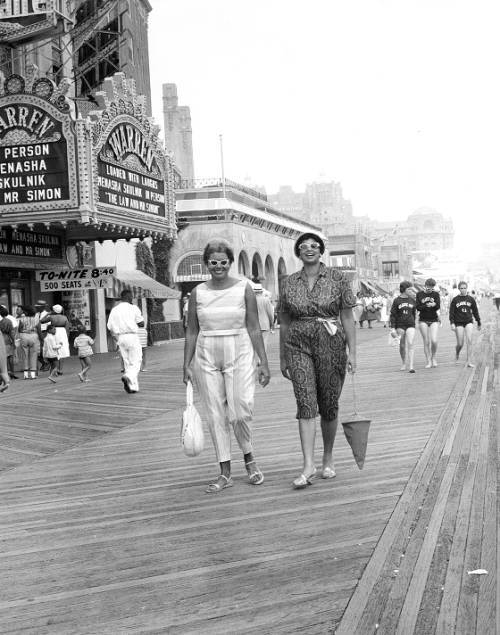-
Title
-
[Two women walking on the Boardwalk in Atlantic City, NJ]
-
Description
-
A black and white photograph taken by John W. Mosley. The image features two stylish Black women walking the boardwalk near Chicken Bone Beach in Atlantic City, New Jersey. The pair smile while sporting cat-eyed frame sunglasses. The Warren Theater–formerly the Warner Theater and currently The Hook–sits in the background.
-
Between 1900 and the early 1950s, African Americans were socially restricted to use the Missouri Avenue Beach Area affectionately called Chicken Bone Beach.
Photojournalist, commercial photographer, father, and husband John W. Mosley is best recognized as “a chronicler of black society in the Philadelphia area” (Willis-Thomas 1989, 105).
Mosley was born in Lumberton, North Carolina on May 19, 1907. He began teaching himself photography in his early twenties when he acquired his first simple box camera (A View of History through the Eyes of John Mosley 1992). He moved to Philadelphia, Pennsylvania in 1934, where his career as a professional photographer began at the Barksdale Photography Studio. He eventually became a staff photographer for the Pyramid Club, which was an African American social club dedicated to the cultural, civic and social advancement of Philadelphia’s Black community. He also served as the official photographer for the First African Presbyterian Church in Philadelphia (Caust-Ellenbogen 2014). Overall he was hardworking, traveling on foot or by public transit to photograph four to six events a day (Willis-Thomas 1989, 105; Wellington 2016).
Mosley used the medium of photography to shape how Black Americans were represented. From the 1930s through the 1960s, he photographed daily Black life and vitality in segregated Philadelphia. He was intentional about capturing Black happiness, success, dignity, and assertiveness.He instinctively knew how to “frame a shot” and “capture people in their environment so that place and face seemingly interact” (Willis-Thomas 1989, 105). He was also mindful of the social and interpersonal impact of his images. In 1969, he told a reporter for The Afro-American Newspaper the following:
“I found out by the trial-and-error method…that you have to be sure that the right people are together—whether a certain combination of personalities are friendly—or sometimes resentful of each other—or whether a situation exists that might foster some domestic discord” (Queen 1967).
Mosley was one of America’s first Black syndicated photographers. Every Black newspaper on the eastern coast of the United States featured his images including The Philadelphia Tribune. Papers with national distribution spread his images across the nation. Over the course of his career, Mosley produced more than 300,000 photographs that included prominent 20th century figures and everyday people. He estimated that his Chicken Bone Beach photos alone accounted for 25,000 photos and contained nearly a million faces (Queen 1969).
John W. Mosley died on October 1, 1969, in Reading, Pennsylvania. He was married to Teresa Still, a descendant of the abolitionist William Still. The couple had two sons, John Mosley Jr. and Charles H. Mosley.
More information is available in the annotation of the image.
-
Contributor
-
Temple University Libraries, Charles L. Blockson Afro-American Collection
-
Date Created
-
1959
-
Creator
-
Mosley, John W.
-
Rights
-
This material is subject to copyright law and is made available for private study, scholarship, and research purposes only. For access to the original or a high resolution reproduction, and for permission to publish, please contact Temple University Libraries, the Charles L. Blockson Afro-American Collection (blockson@temple.edu; 215-204-6632).
-
Identifier
-
BPA001X0319590000044
-
Format
-
Image
-
Extent
-
1 image
-
Publisher
-
Temple University Libraries, Charles L. Blockson Afro-American Collection
-
Is Part Of
-
John W. Mosley Photograph Collection
-
Subject
-
African American women
-
Atlantic City (N.J.)
-
Beaches
-
Leisure
-
Joy
-
Mosley, John W. (1907-1969)
-
Photography


